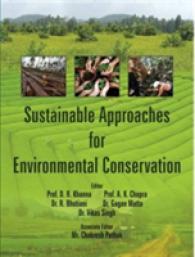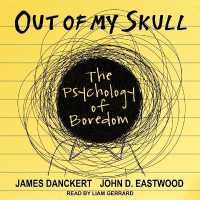Full Description
It is said that words are like people: One can encounter them daily yet never come to know their true selves. This volume examines what words are—how they exist—in religious phenomena. Going beyond the common idea that language merely describes states of mind, beliefs, and intentions, the book looks at words in their performative and material specificity.
The contributions in the volume develop the insight that our implicit assumptions about what language does guide the way we understand and experience religious phenomena. They also explore the possibility that insights about the particular status of religious utterances may in turn influence the way we think about words in our language.
Contents
Introduction: 'Any more deathless questions?', Asja Szafraniec and Ernst van den Hemel Part 1: What are words? 'Word as Act: Varieties of Semiotic Ideology in the Interpretation of Religion', Michael Lambek 'The power of words and the performative context', Jacqueline Borsje 'Inscriptional Violence and the Art of Cursing: A Study of Performative Writing', Jan Assmann 'Words and Word-Bodies: Writing the Religious Body', Loriliai Biernacki Part 2 Religious Vocabularies: 'Semantic Differences; or, "Judaism"; "Christianity"', Daniel Boyarin 'The Name God in Blanchot', Jean-Luc Nancy 'Humanism's Cry: On Infinity in Religion, and Absence in Atheism-A Dialogue with Blanchot and Nancy', Laurens ten Kate 'Intuition, Interpellation, Insight: Elements of a Theory of Conversion', Nils F. Schott 'Allowed and forbidden words: Canon and Censorship in "Grunbegriffe", "Critical terms", Encyclopaedias', Christoph Auffarth Part 3: Transmitting and Translating the Implicit 'God lisped: divine accommodation and cracks in Calvin's Scriptural voice', Ernst Van den Hemel 'Rethinking the Implicit: Fragments of the Project on Aggada and Halakhah in W.Benjamin', Sergey Dolgopolski 'What Cannot Be Said: Apophasis and the Discourse of Love', Jean-Luc Marion 'Jean-Luc Marion and the Basic Problems of Phenomenology', Tarek Dika Part 4: Situating Oneself via Language 'A Quarrel with God: Cavell on Wittgenstein and Hegel', Asja Szafraniec 'Thinking about the Secular Body, Pain, and Liberal Politics', Talal Asad 'The Rise of Literal-Mindedness', Peter Burke 'Fiction-based Religion: From Star Wars to Jediism', Markus Altena Davidsen 'Prayer: Addressing the Name', Karmen Mackendrick Part 5 Language and the Foundation of Communities 'The Words of the Martyr. Media, Martyrdom and the Construction of a Community', Pieter Nanninga "Spritual X-ray Vision": the Religio-Political Rhetoric of Abraham Kuyper', Arie L. Molendijk 'Thinking through Religious Nationalism', Roger Friedland and Kenneth B. Moss








